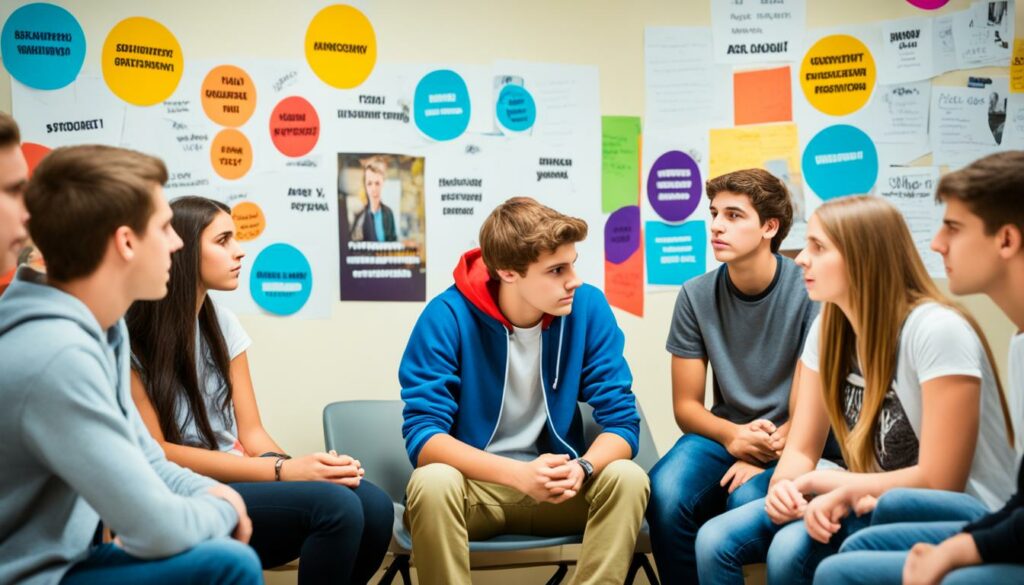Helping Your Teen Make Friends Effectively
As parents, we play an important role in supporting our teenagers in making friends and developing meaningful relationships. Adolescence can be a challenging time when it comes to socializing, but with our guidance and encouragement, we can help our teens build a strong social network and navigate the complexities of friendship effectively.
Teenage friendships are crucial for their overall well-being and development. Friends provide companionship, support, and opportunities for personal growth. By fostering social connections, we can help our teenagers build self-esteem, expand their perspectives, and create a sense of belonging outside the family.
So how can parents guide their teens in making friends? It starts with open communication and discussing the value of honesty in friendships. We can highlight positive qualities in their peers and encourage bonding over common interests. It’s also important to respect their preferred socialization styles and provide them with the necessary support to navigate social interactions confidently.
In this article, we will explore various strategies and tips to help you support your teenager’s social life and empower them to make friends effectively.
Key Takeaways:
- Building a strong social network is essential for teenagers’ overall well-being and development.
- Open communication and discussing the value of honesty in friendships can guide your teen in making friends.
- Highlight the positive qualities of their peers and encourage bonding over common interests.
- Respect your teen’s preferred socialization styles and provide them with the necessary support.
- By fostering social connections, you can help your teenager build self-esteem and a sense of belonging.
The Role of Friendship for Teens

Friends play a crucial role in the lives of teenagers, providing companionship, support, and opportunities for personal growth. The importance of teenage friendships cannot be underestimated, as they have a profound impact on a teenager’s overall well-being and development. Let’s explore the significance of friendships and their impact on teenagers’ lives.
First and foremost, teenage friendships serve as a strong support network for adolescents. Having friends who genuinely care and understand them can provide teenagers with emotional support during challenging times. Friends offer a listening ear, advice, and a shoulder to lean on, helping teenagers navigate the ups and downs of adolescence.
Furthermore, good friends can boost a teenager’s self-esteem. Through positive interactions and encouragement, friends help teenagers develop a sense of self-worth and confidence. Having friends who appreciate and value them for who they are can contribute to building a healthy self-image and a positive outlook on life.
Teenage friendships also expose adolescents to new ideas and perspectives. Friends offer different viewpoints, interests, and experiences, broadening teens’ horizons and helping them develop a more comprehensive understanding of the world. These interactions can spark intellectual curiosity, promote critical thinking, and encourage personal growth.
Additionally, friendships provide a sense of belonging and acceptance. Adolescence can be a time of identity formation and self-discovery, and friends play a significant role in this process. Having a group of friends who share common interests and values provides teenagers with a sense of belonging and a place where they can be themselves without judgment.
Let’s not forget that friendships offer opportunities for fun, laughter, and shared experiences. Whether it’s going to the movies, participating in sports, or simply hanging out, friends create memories that teenagers will cherish for a lifetime. These shared moments of joy and happiness contribute to the overall well-being and happiness of teenagers.
Now that we understand the importance and impact of friendship for teens, it is essential for parents and guardians to encourage and support their teenagers in building and maintaining meaningful friendships. By understanding the role of friendship in their teenagers’ lives, parents can provide guidance and create an environment that fosters friendship development.
Check out the table below to see the various aspects of teenage friendships and their effects on teenagers:
| Aspect | Effects on Teenagers |
|---|---|
| Emotional Support | Provides comfort, empathy, and a listening ear during challenging times. |
| Self-Esteem | Boosts confidence, self-worth, and positive self-image. |
| Perspective | Exposes teenagers to new ideas, interests, and perspectives. |
| Sense of Belonging | Provides a supportive and accepting social circle where teenagers feel valued and accepted. |
| Shared Experiences | Creates happy memories, fun moments, and opportunities for personal growth. |
Tips for Guiding Your Teen in Making Friends

Parents play a vital role in guiding their teenagers in the process of making friends and building meaningful relationships. By providing guidance and support, parents can help their teens navigate the challenges of friendship and create connections that are based on trust and honesty.
Here are some practical tips to help you guide your teen in making friends:
- Discuss the value of honesty: Emphasize the importance of being honest and trustworthy in friendships. Encourage your teen to prioritize sincerity and openness with their peers, as this will foster stronger and more authentic connections.
- Highlight positive qualities in peers: Help your teenager appreciate and recognize the positive qualities in others. Encourage them to look beyond superficial characteristics and focus on the traits that make someone a good friend, such as kindness, empathy, and loyalty.
- Encourage common interests: Identify activities or hobbies that your teen is passionate about and encourage them to pursue these interests. By engaging in activities they enjoy, your teen is more likely to meet like-minded individuals who share their passions, making it easier to build connections.
- Support different socialization preferences: Every teenager has their own preferred way of socializing. Some may enjoy large group settings, while others may prefer one-on-one interactions. Recognize and respect your teen’s socialization preferences and help create opportunities for them to socialize in ways that align with their comfort level.
Remember, friendships should be based on mutual respect, shared values, and common interests. By guiding your teen in making friends, you are helping them develop the skills and confidence to form lasting and meaningful connections.
By implementing these tips, you can help your teenager navigate the challenges of making friends, foster trust and honesty in their relationships, and encourage the development of genuine and supportive connections that can positively impact their social and emotional well-being.
| Tips for Guiding Your Teen in Making Friends |
|---|
| Discuss the value of honesty |
| Highlight positive qualities in peers |
| Encourage common interests |
| Support different socialization preferences |
Using Personal Friendships as an Example

Parents have a powerful influence on their teenage children, and one way they can positively impact their teens’ social lives is by setting an example through their own friendships. By nurturing and supporting their own friendships, parents can show their teenagers the value of strong and supportive relationships.
Sharing experiences with friends is an excellent way to demonstrate the importance of friendship. Whether it’s going out for a movie night, taking a road trip, or simply spending quality time together, parents can involve their teens in these social activities. This not only allows for bonding moments but also provides an opportunity for teenagers to witness firsthand the joy and fulfillment that come from meaningful connections with friends.
Nurturing and supporting friendships, both in their own lives and in their teens’ lives, is essential. Parents can encourage their teenagers to prioritize friendships by discussing the significance of these relationships and actively promoting a supportive environment. By fostering an atmosphere of trust and understanding, parents can help their teens develop the skills needed to maintain healthy friendships.
Involving teens in social activities with friends not only strengthens their existing friendships but also provides opportunities to meet new people and expand their social circles. Parents can organize get-togethers, encourage their teens to participate in group activities or clubs, or even consider hosting sleepovers or parties. These experiences allow teenagers to develop valuable social skills, boost their self-confidence, and forge new friendships.
By using their own personal friendships as an example, parents can guide and inspire their teenagers to foster meaningful connections. Sharing experiences, nurturing and supporting friendships, and involving teens in social activities with friends can have a positive impact on their social lives and overall well-being.
Remember, teenagers learn by observation, and the friendships they witness their parents cultivating can shape their own perspectives on friendship and relationship dynamics. Setting a positive example through friendships can help teenagers navigate the challenges and complexities of social interactions, giving them a strong foundation for building lasting and fulfilling relationships.
| Benefit | Description |
|---|---|
| Emotional Support | Friends provide a listening ear, empathy, and a sense of belonging. |
| Positive Influence | Having friends with similar values can inspire personal growth and foster positive behaviors. |
| Shared Experiences | Friendships create memories and allow for the enjoyment of activities together. |
| Mental Well-being | Strong friendships contribute to reduced stress levels and improved mental health. |
| Personal Development | Friends help teenagers develop social skills, empathy, and a sense of self-identity. |
Supporting the Development of Judgment

Parents play a crucial role in supporting their teenagers in developing good judgment when it comes to friendship. Navigating the complexities of social relationships can be challenging for teens, but with guidance and a safe space for discussion, parents can help them make informed choices and build healthy friendships. Here are some essential ways parents can support their teens in judgment development:
- Encouraging Patience in Friendship: It’s important for teens to understand that building strong friendships takes time. Encourage your teen to be patient and give friendships the opportunity to grow and evolve naturally. Remind them that genuine connections require effort and investment.
- Providing a Safe Space for Discussion: Create an open and non-judgmental environment where your teen feels comfortable discussing their friendships. Offer guidance and perspective when they encounter challenges or conflicts. Through constructive conversations, they can learn to assess situations and make informed decisions.
- Giving Quieter Peers a Chance: Remind your teen to consider quieter peers who may not be as outgoing or assertive. Encourage them to look beyond the surface and give these individuals a chance. Quiet friends can bring unique qualities and perspectives to friendships.
- Recognizing and Addressing Negative Influences: Teach your teen about the importance of recognizing negative influences and toxic friendships. Help them identify red flags such as manipulation, disrespect, or consistently negative behavior. Empower them to distance themselves from such influences and prioritize their well-being.
Remember, as a parent, your role is to guide and support your teen. It’s natural for them to make mistakes and encounter challenges along the way. By fostering open communication and providing a foundation of trust, you can help your teen develop good judgment and build meaningful friendships.
Nurturing Mutual Respect
One crucial aspect of supporting judgment development in teens is nurturing mutual respect in their friendships. Encourage your teen to prioritize and value relationships based on mutual respect and shared values. Discuss the importance of healthy boundaries, effective communication, and mutual support. When teens foster a foundation of respect in their friendships, they are more likely to make sound judgments and maintain positive, long-lasting connections.
Addressing Loneliness and Social Challenges

Sometimes teenagers face social challenges that can lead to feelings of loneliness and isolation. It is important for parents to recognize and address these issues to support their teens’ mental health and well-being. In this section, we will explore effective strategies for helping teens overcome social obstacles and build meaningful connections.
The Impact of Social Challenges
Social challenges can have a profound effect on teenagers’ mental health. Feelings of loneliness and isolation can contribute to symptoms of depression and anxiety. It is crucial for parents to be aware of the signs that their teen may be struggling with their social life.
Signs of Depression or Anxiety:
- Withdrawal from social activities
- Loss of interest in hobbies or activities once enjoyed
- Changes in appetite or sleep patterns
- Irritability or frequent mood swings
- Difficulty concentrating or making decisions
If you notice any of these signs in your teenager, it is important to address their mental health concerns and provide the necessary support.
Addressing Mental Health Concerns
When dealing with social challenges, it is essential to prioritize your teen’s mental health. Encourage open communication and let your teen know that it’s okay to ask for help. Consider seeking professional guidance from a therapist or counselor who specializes in working with teenagers. They can provide valuable insights and techniques to help your teen cope with feelings of isolation and develop strategies for building social connections.
Importance of Social Skills Training
Social skills training can be a valuable resource for teens who struggle with communication and building relationships. These programs offer guidance and practice in areas such as initiating conversations, active listening, conflict resolution, and empathy. By equipping your teenager with these essential social skills, they will feel more confident and better prepared to navigate social challenges.
Remember, addressing social challenges requires patience and understanding. Be supportive and advocate for your teen’s well-being. With the right support and resources, they can overcome these obstacles and thrive socially.
Strategies for Addressing Social Challenges in Teens
| Strategies | Description |
|---|---|
| Open Communication | Encourage your teen to express their feelings and concerns openly. Provide a safe and non-judgmental space for them to share their thoughts. |
| Professional Help | If needed, seek guidance from a therapist or counselor who specializes in working with teenagers. They can provide valuable insights and techniques to help your teen cope with social challenges. |
| Social Skills Training | Enroll your teen in social skills training programs or workshops to enhance their communication and relationship-building abilities. |
| Encourage Involvement | Support your teen’s participation in activities and clubs that align with their interests. This can provide opportunities for them to meet like-minded peers. |
| Establish Peer Support | Encourage your teen to seek out and maintain positive friendships. Peer support can provide a sense of belonging and emotional support. |
Encouraging Extracurricular Activities and Get-Togethers
One effective way to support your teenager in making friends is by encouraging their involvement in extracurricular activities and attending social events. These activities provide opportunities for them to meet new people who share similar interests and hobbies. Not only do extracurricular activities foster personal growth and skill development, but they also create a platform for socializing.
By participating in clubs, sports teams, or artistic groups, your teen can connect with peers who have similar passions. This shared interest serves as a foundation for building friendships and offers a sense of belonging within a like-minded community. Whether it’s joining a sports team, drama club, or music ensemble, extracurricular activities provide a structured environment where your teenager can interact with others and cultivate meaningful relationships.
“Extracurricular activities provide a structured environment where your teenager can interact with others and cultivate meaningful relationships.”
In addition to extracurricular activities, you can also support your teen by hosting get-togethers. Hosting a gathering at your home or organizing an outing allows your teenager to socialize in a safe and inclusive environment. You can encourage your teen to invite friends over for movie nights, game sessions, or even study groups. Creating opportunities for socializing not only strengthens existing friendships but also opens the door for new connections to form.
Remember to involve your teen in the planning process, allowing them to take ownership and feel empowered. This collaborative approach helps develop their social skills and fosters independence. By hosting get-togethers, you create a positive space for your teenager and their friends to relax, have fun, and deepen their social bonds.
Benefits of Encouraging Extracurricular Activities and Get-Togethers
Encouraging your teenager’s involvement in extracurricular activities and hosting get-togethers provides numerous benefits:
- Opportunities to meet new people who share common interests
- Development of social skills and the ability to navigate different social settings
- Enhancement of communication and teamwork skills through collaborative activities
- Increased self-confidence and self-esteem by participating in activities they enjoy
- Building a supportive network of friends who share similar passions
- Creating a sense of belonging and community
Quotes from Experts
“Extracurricular activities offer an ideal environment for teenagers to forge friendships based on shared interests and passions. It provides them with a sense of belonging and a space to explore their identities outside of academics.” – Dr. Samantha Peters, Child Psychologist
“Hosting get-togethers not only allows teenagers to socialize, but it also encourages them to take the lead in organizing events and strengthens their interpersonal skills. It provides an opportunity for them to create a positive and inclusive environment for their friends.” – Emily Johnson, Parenting Coach
Sources
| Source | Link |
|---|---|
| Psychology Today | Link |
| Verywell Family | Link |
Considering Sleepaway Camp and Social Skills Training
Sleepaway camp can be a valuable experience for teenagers to develop social skills and make new friends in a different setting. It provides an immersive environment where teens can engage in various activities, build teamwork, and learn to communicate effectively with their peers.
During sleepaway camp, teenagers have the opportunity to interact with a diverse group of individuals from different backgrounds. This exposure helps broaden their perspectives, fosters empathy, and teaches them how to navigate social interactions outside of their familiar surroundings.
In addition to sleepaway camp, social skills training can also be beneficial for teens. These training programs focus on improving communication skills, developing self-confidence, and enhancing interpersonal relationships.
Social skills training typically involves role-playing scenarios, group discussions, and feedback sessions. It helps teenagers understand non-verbal cues, express themselves assertively, and manage conflict effectively. By equipping teens with these essential skills, they can navigate social situations with greater ease and improve their overall social well-being.
Seeking Professional Help and Assessing Mental Health Concerns
While sleepaway camps and social skills training can be effective in enhancing social development, it’s essential for parents to assess their teen’s mental health and seek professional help if needed.
“Sometimes, difficulties in making friends may be an indication of underlying mental health concerns. It is crucial for parents to pay attention to signs of depression, anxiety, or other mental health issues that may impact their teenager’s social interactions.”
By consulting mental health professionals, parents can gain insights into their teen’s emotional well-being and receive guidance on how to address any concerns. These professionals can provide valuable support and help develop personalized strategies to assist teenagers in building social connections and friendships.
Moreover, seeking professional help can also aid in identifying and addressing any potential communication or socialization challenges that may require specialized intervention.
| Benefits of Sleepaway Camp | Benefits of Social Skills Training |
|---|---|
| 1. Development of social skills and self-confidence | 1. Improved communication and interpersonal relationships |
| 2. Exposure to diverse peers and perspectives | 2. Enhanced assertiveness and conflict management |
| 3. Opportunities for teamwork and collaboration | 3. Increased empathy and understanding |
| 4. Exploration of new interests and hobbies | 4. Better understanding of non-verbal cues |
Both sleepaway camp and social skills training provide teenagers with valuable tools for personal growth and enhancing their social experiences. By combining these approaches and seeking professional help when necessary, parents can actively support their teens in building meaningful relationships and navigating the complexities of social interaction.
Conclusion
Helping your teenager make friends is an ongoing process that requires parental support and guidance. It is crucial to understand the importance of supporting teen friendships and empowering teens to make friends. By creating a supportive environment, encouraging their interests, and providing opportunities for socialization, parents can play a vital role in helping their teens build meaningful relationships.
It’s important to note that each teenager’s journey toward making friends is unique, and it may take time for them to find their place and form lasting connections. As parents, it is essential to approach this process with love, patience, and ongoing support. By being there for your teen, they can navigate the complexities of friendship and social relationships with greater confidence and resilience.
Remember, ongoing parental support is key. Stay involved, have open conversations about their friendships, and continue to guide them in developing good judgment. By staying connected and showing interest in their social lives, you can provide the necessary support and encouragement for them to thrive socially. Together, you can empower your teenager to cultivate and maintain lasting friendships, promoting their overall well-being and happiness.
FAQ
How can I help my teenager make friends?
You can support your teenager in making friends by providing guidance, discussing the value of honesty, helping them bond over common interests, and supporting their preferred socialization styles.
Why are friendships important for teenagers?
Friendships play a vital role in a teenager’s life as they provide companionship, support, and opportunities for personal growth. Good friends can boost self-esteem, introduce new ideas and perspectives, and provide a sense of belonging outside of the family.
How can I set an example for my teenager when it comes to friendship?
You can set an example by demonstrating the importance of friendship in your own life. Share experiences, nurture and support your own friendships, and involve your teenager in social activities with your friends.
What can I do to help my teenager develop good judgment in friendship?
Encourage patience, give quieter peers a chance, and address negative influences or toxic friendships. Provide guidance and a safe space for discussion to help your teen navigate the complexities of friendship.
How can I address feelings of loneliness or social challenges my teenager may face?
Be aware of signs of depression or anxiety and address any underlying mental health concerns. Consider social skills training for improved communication and seek professional help if necessary.
How can extracurricular activities and get-togethers support my teenager’s social life?
Encourage participation in activities and events that provide opportunities to meet new people and make friends. Host get-togethers and create safe and inclusive environments for socializing.
Are there any specific recommendations for sleepaway camp and social skills training?
Sleepaway camp can provide valuable experiences for developing social skills and making new friends in a different setting. Social skills training can help improve communication and navigate social interactions more effectively. If needed, don’t hesitate to seek professional help for underlying mental health concerns.
What is the key to helping my teen make friends?
Helping your teenager make friends is an ongoing process that requires parental support and guidance. By fostering a supportive environment, encouraging their interests, and providing opportunities for socialization, parents can empower their teens to build meaningful friendships.
Source Links
- https://carolinemaguireauthor.com/how-to-help-a-teen-who-has-few-to-no-friends-now-that-school-is-in-full-swing/
- https://evolvetreatment.com/blog/help-teenager-make-friends/
- https://parents.au.reachout.com/common-concerns/everyday-issues/things-to-try-peer-pressure/help-your-teenager-make-great-friends







